After becoming the first distillery in Chicago since well before Prohibition, winning a double gold medal at this year’s San Francisco World Spirits Competition, numerous branding awards, best in show at the Los Angeles International Spirits Competition, and helping to establish over 90 distilleries throughout the United States and Canada, it’s fair to say that Koval Distillery has made good use of the seven short years since it was founded.
The success of its whiskies and the recent launch of its award-winning dry gin have helped to put their city back on the map of American craft distilling, and their work as educators has left an indelible mark on the industry as it has taken form over the last decade.
Dr. Robert Birnecker and Dr. Sonat Birnecker-Hart—the husband-and-wife proprietors behind Koval—forged an unconventional path to that success. Through their hard work, dedication to their craft, some legislative persistence, and a healthy dose of luck, they have managed to create one of America’s most successful independent distilleries from the ground up.
It’s Not a Daycare, We Swear
The Birneckers are some of the most sought-after minds in the word of craft distilling today. When Koval first opened in Chicago’s North Side neighborhood of Ravenswood, however, the couple found themselves getting requests for a very different kind of service.
Neither of us liked gin, so we approached the project as a challenge to create a gin that even we would love.
Sonat, who at the time was a new mother, explains, “When we first started, most of the people at the distillery were actually kids and their moms, or their caregivers and their nannies, because we would set up our water table and our son would be playing, and all the neighborhood kids would come over. Where the store is now, we had this whole play area with a slide, a library, and little squishy mats. People used to come to the distillery and they would say, ‘Oh, can I sign my kids up for classes?’ I’d have to tell them, ‘Well, we make whiskey. So I don’t know about that.’ Everyone thought we were a daycare center.”
Sonat’s responsibilities as a young mother and burgeoning distiller became entwined at times for some pretty memorable results. “It was intense. I was mashing, nursing, and reading Sylvester and the Magic Pebble. I was literally working all the time. We were at the distillery until after midnight every day in the beginning. I look back on it, and it was really fun. It was really hard.”
A Clean Philosophy
That hard work (and admittedly difficult work-life balance) has paid off in a big way. The whiskeys they created in that space have gone on to win some extremely prestigious awards, and have landed Koval on the top-pick lists of writers from Whisky Advocate to the New York Times.
“We focus on making spirits—making them incredibly well, and making them in our particular style, which is very clean. We only use the heart cut. We have particular methods that we stick to. Grain to bottle. We love being completely organic and kosher, as well.”
That cleanness and dedication to organic grains are two things that make their spirits stand out from the crowd. Take, for example, their rye whiskey. In contrast to many brands that only use a 51% rye blend (the bare legal minimum), Koval’s version uses 100% midwestern-grown organic rye, giving it a unique flavor profile that you simply can’t get from any other grain mash.
Additionally, the choice to use millet in their bourbon is something whiskey purists may initially scoff at, but the proof is in the flavor. Sonat talks about it with great affection.
“I’m really proud of our bourbon. We tried every bourbon we could get our hands on, and we worked on all the kinds of things that we liked about them and what we didn’t like about them. We wanted to create a product that would offer something new to the category, so we came up with doing a mash with 51% corn and the rest millet. It’s not a secret, everyone knows what we’re doing. It’s corn and millet. No one’s really done a bourbon with such a unique alternative grain before.”
Recently, in a departure from their whiskey roots, Koval branched out by releasing their first gin—and given that it was awarded a Double Gold at the San Francisco World Spirits Competition, it seems their first foray into this new category was a success. In a stylistic synthesis of London Dry and modern American recipes, it features some innovative botanicals like grains of paradise, rose hip, and angelica root.
“Neither of us liked gin, so we approached the project as a challenge to create a gin that even we would love. We did a lot of experimentation with flavor profiles and ratios, especially juniper. I love juniper, but for some reason a lot the gins that I’ve tried I just didn’t like. We wanted to do a real hardcore gin where there’s evisceration and distillation of all the botanicals, so that you’re getting a real potent flavor profile in the gin itself, yet smooth and clean like all of our spirits. For me, we achieved it, and we hope that other people enjoy it, too.”
The Bottle By Its Cover
The distinctive label on their gin has also garnered a lot of attention. The bottle features an intricate, laser-cut design created for Koval by Sonat’s sister and her firm Dando Projects. But creating a successful design didn’t happen overnight, and there were certainly some hiccups along the way.
“We can do a lot of things ourselves, but branding is not one of them. When we first launched our whiskey we did it under the name Lion’s Pride, and it was just not done well. Robert and I did it one Sunday in bed with our computer and our limited Illustrator skills. Sure, it saved us a lot of money, but it ultimately was very detrimental to launch our whiskey line that way.
Photo: David Michaels
“Luckily, my sister’s been in branding for decades and has worked for everybody from Vogue to Sundance to you name it. She kept telling us, ‘You guys need to go to a branding firm that does liquor. You need to really put your best foot forward because what’s in the bottle could be amazing, but you’re going to turn a lot of people off before they even get to try it if your brand is terrible.’”
At the time, the couple were still getting their start, and the prospect of hiring others to do anything was a difficult pill to swallow. Still, the expert was persistent.
“Finally, we did go to a branding company that did some liquor and they did a horrendous job. We were miserable. It was the most expensive laugh I think we’ve ever had in our lives. My sister was absolutely horrified because she sort of forced us to do it. We did it, we spent the money, and then it was a disaster. So she said, ‘You know what? I’m just going to do this myself.’” It wasn’t the most traditional route to finding a label design, but the final product was worth the wait.
Changing Course
Before they ever broached the idea of starting a distillery, Sonat and Robert were fairly well ensconced in their academic careers in Washington, DC. But despite their success, they couldn’t help but feel like something was missing from their lives.
I don’t think we ever considered the fact that we could fail. We really never thought like that.
“We had gotten to the point that I think a lot of people get to, where they’ve saved up a little money and they start looking to buy their first house. They’re going on all these house hunts, and they may be looking at houses and thinking, ‘You know, I’m not finding anything that I really love.’ They may be realizing that in doing it, they’re declaring something about their lives. They’re saying, ‘Okay I’m settling down.’ For us it started to feel like we were just settling and not really being where we wanted to be.”
The Birneckers decided that the life they wanted looked different. They wanted to create something, make something with their hands, and they couldn’t stand the thought of any more hours-long commutes on congested freeways. The way they decided they could get all of these things was by starting a family business.
“It had to be a decision that we were going to make a complete change. We were actually fine with that. I feel like life can have many different stages and chapters, and I’m not afraid of that at all. I find it exciting and refreshing in certain ways. So, distilling became the obvious choice for us, in part because Robert grew up in the industry.”
“Grew up in the industry” is a bit of an understatement; Robert’s family has been producing award-winning wine and brandy for four generations at their distillery in Austria. It was natural for Robert to develop a love of distilling, one that goes beyond wanting to make something people will buy.
“We were sitting around at my parents’ house over the holidays, and we’d brought some of my grandfather-in-law’s brandy. We were all sipping it and everyone was talking about how great it was and saying things like, ‘Why can’t we have brandies like this in America?’ Robert went through this whole elaborate explanation of the distilling techniques that went into it, and my sister said, ‘Well, why don’t you just do that?’ The idea was just a joke at first, but later that afternoon she came across a TIME magazine article about a distillery in upstate New York that was doing quite well. My sister said, ‘If these guys can do it, so can you,’ and it just stuck.”
“Just Put It on Our Tab”
Over the years, the couple has taken advantage of Robert’s family business (as well as their own time living abroad) to make some valuable contacts in the European distilling industry. Sonat explains that this was a major factor in their decision to jump into craft distilling.
“We knew all of the suppliers, and we both speak fluent German. It ended up being extremely helpful, considering all of the industrial equipment that’s required for a distillery—particularly on a smaller scale, as opposed to these huge distilleries that companies like Diageo might have, that’s a very different animal. For more of a craft or artisanal distillery, you’re going to need different equipment which comes from a number of different companies in Germany, Austria, and Italy. We had the linguistic ability to speak with these companies directly, and we went there all the time, which made the process much easier.”
Still, the investment it takes to start a distillery from scratch is immense. Copper stills are expensive, and housing them along with a plethora of 30-gallon whiskey casks) takes a lot of space—space that, in the middle of a major city like Chicago, never comes cheap. In order to get things going, the couple had to make some financial decisions that, in hindsight, may have been a bit too risky for a family who had just had their first child.
“I don’t think we ever considered the fact that we could fail. We really never thought like that. If we did then we would’ve addressed it, but it wasn’t even on our radar.” That blind optimism certainly explains what they did to raise capital, quickly and without the help of a bank.
“This was before the whole economy tanked. Right when we were starting, we were getting all these offers from credit card companies that said things like, ‘Zero percent financing for a year, transfer all your money from one card to another and don’t pay any financing on it until 2009.’ We were like, ‘Great! Let’s just charge up all of our credit cards that we currently have, and then transfer the balance to tons of these zero-percent-financing cards.’
“Now, I wouldn’t recommend that, at all, to people looking to start businesses. It’s not a good idea, but it worked out for us. It was a pretty ballsy move because ultimately, what was going to happen in 2009 or after twelve months, is it would be 26 percent interest per month. It was free money for a minute, and then it was going to be very expensive. We had to pay those cards off before it would’ve been a financial disaster, and we managed to do it. We had to. We were willing to take a lot of risks because we were just going to make it work one way or the other.”
The Windy City, Distilled
Distilling in Chicago at the time was uncharted territory. There hadn’t been an active legal still in Chicago since the mid-1800s, and the Birneckers were concerned about how the locals might react to one suddenly popping up in their backyard. Finding the right neighborhood would be vital.
“When we started, I wrote about ten letters to various aldermen. Having grown up in the area, I knew the importance of aldermen and how they can really help businesses. The first one to call me was Gene Schulter of the 47th Ward, and I can’t even tell you how amazing his help was. He’s like, ‘I’ve got a place for you. I got a guy.’ I was like, ‘Really?’ It was hilarious. It could almost be something that you’d see in a movie about Chicago. He had a guy and his guy did have a place.”
It wasn’t until later on that the realities of owning a distillery in Chicago started to surface. “I realized that there were a number of impediments to growth, one of them being that we didn’t have the rights, just as a business, that many other distilleries had in other states. Particularly smaller craft distilleries. We were not allowed to have a tasting room. We were not allowed to retail on site. We couldn’t really do tours. None of that was possible—it was actually against the law.”
Faced with being hamstrung by these outdated regulations, Sonat decided to make some more phone calls. She was determined to figure it out, even if it meant changing some of the laws herself.
“I called up Gene Schulter again and I said, ‘We really need to figure out a way to have a tasting room and a retail store.’ Literally the next day I was in the Alderman’s office with our Senator, Heather Steans, and our Representative, Greg Harris. We started figuring out a plan to introduce a bill to Springfield to make it possible to have a craft distillery license. We just made it happen.” You may be noticing a theme here.
Crafting the Competition
In so doing, the Birneckers have earned a legitimate claim to being the first couple of Illinois’ burgeoning distilling industry. “We changed the laws, and when that happened, all of a sudden you started seeing a lot of other distilleries starting in the area.”
This was the beginning of what has since become Kothe Distilling Technologies. Kothe stills are the brand of stills that the couple has used since the beginning. They now represent the firm in North America and operate as consultants for the brand.
It’s not for everybody, but we hope that people want to drink to enjoy life, for life’s good times with other people.
“We’d get phone calls from these people who’d say, ‘I’ve been making whiskey in my backyard for years!’ And I’d have to tell them, ‘Okay, but don’t say that to anybody! It’s a federal offense.’ They’d say that they wanted to start doing it for real, and then ask how we got started. We didn’t want to be mean, so we’d end up being on the phone with these people for hours every day.”
A profile in the Chicago Tribune didn’t do much to stem the tide of curious aspiring distillers, and soon the Birneckers were overwhelmed. “Eventually we realized that, instead of being on the phone all the time, we could just start holding workshops. We said, ‘You know what? We would be happy to give you all this information. Our next workshop is in September, sign up.’ And then, suddenly, we had a consulting business.”
Between Kothe Distilling, Koval’s workshops, Robert’s involvement as a distilling instructor at the Siebel Institute in Chicago, and personal consulting (which they somehow seem to still fit into their schedules), the couple has helped set up over 90 distilleries in the United States and Canada. And as you might expect, some of the people they helped establish ended up in direct competition with Koval. It’s something the Birneckers have always welcomed, though, because as far as they’re concerned a strong craft distilling market helps everyone.
“Since 2008, we’ve become very entrenched in the contemporary distilling world and have an amazing overview of what’s going on in the craft scene. We’re happy to share all of our information. We wanted the entire category of craft or artisan spirits to be strong because, all of a sudden, if you have these people that are ex-lawyers or ex-doctors or ex-weathermen or whatever becoming distillers without any proper education and winging it, they could easily make poor products, and then people would be less willing to try ours.”
Looking Forward
Obviously, Koval and the Birneckers’ contributions to craft distilling goes well beyond the products they make. In addition to the distilleries they’ve advised, the couple estimates that they’ve helped more than 2,800 people learn more about artisanal spirits. They fostered a market that had very few standout products only a few years ago, and helped turn it into one of the most successful new industries in the modern economy. Along with many other craft distillers, their success has undoubtedly captured the attention of major distilleries, leading them to establish more artisanal brands themselves (for better or for worse).
Ultimately, the entire endeavor has grown out of the Birneckers’ desire to create a beautiful life for themselves and others. Sonat summarizes this perfectly: “It’s not for everybody, but we hope that people want to drink to enjoy life, for life’s good times with other people. Their friends, their loved ones. Doing it right, getting it out, and making sure that we were able to curate our products in a particular market the way we wanted them to be experienced. That’s something that we’ve taken very seriously.”
The future of Koval is certainly an exciting thing to think about. The couple already makes some fantastic brandies, liqueurs, and vodka in addition to their whiskeys and gin, but they’ve never been particularly timid when it comes to taking on new challenges. After such wild success with the launch of their gin, an agave-based spirit, rum, or any number of other products don’t seem too far out of the question.
Today, Koval resides in a much larger facility than the humble warehouse in Ravenswood where they first set up shop. They’ve recently extended their distribution globally (to Canada, Germany, Japan and the UK so far), and it seems fitting that a brand with such international roots is finally being enjoyed the world over. Their barrels are even seeing new life as well, as they’re put to use in craft breweries and Scotch distilleries. And while nothing is certain, it seems that whatever the Birneckers choose to do next, it will be done well and, as always, as a family.
All Photos: Jaclyn Simpson Photography, unless otherwise attributed
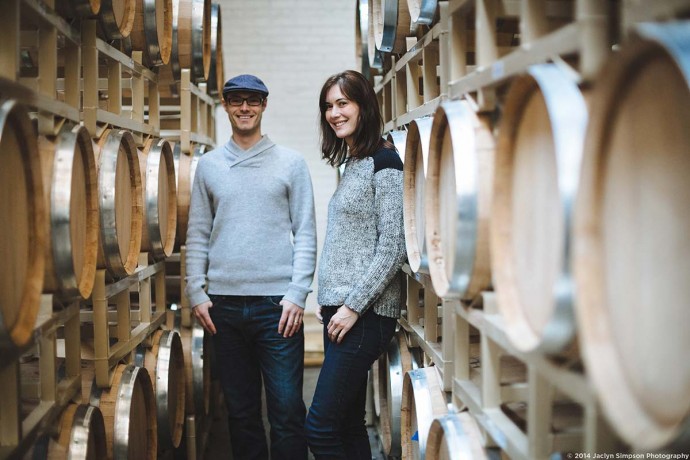
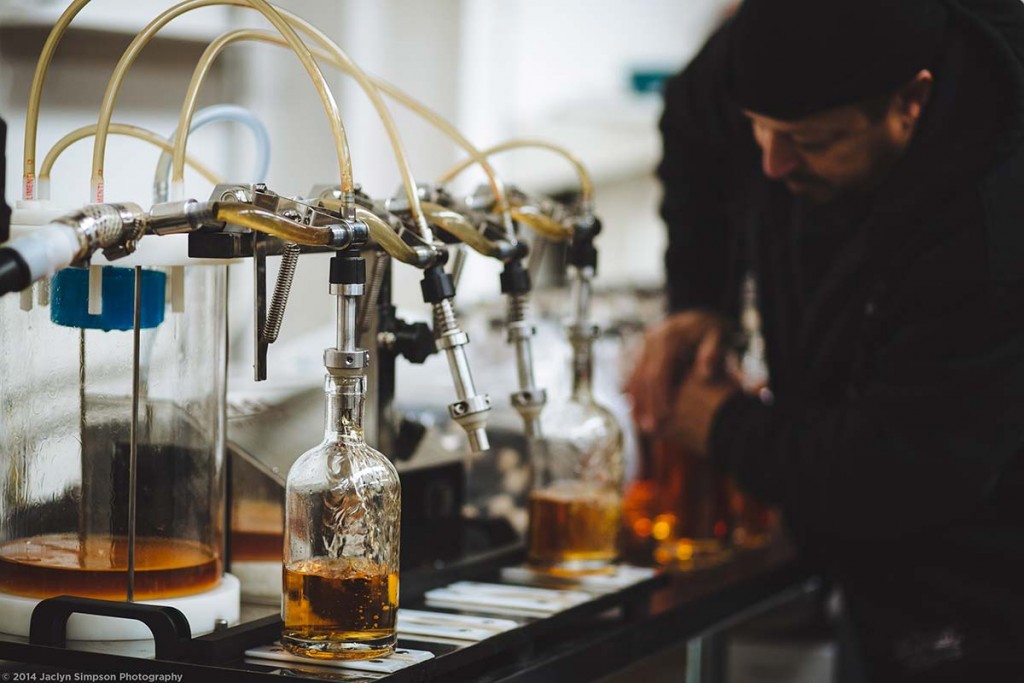
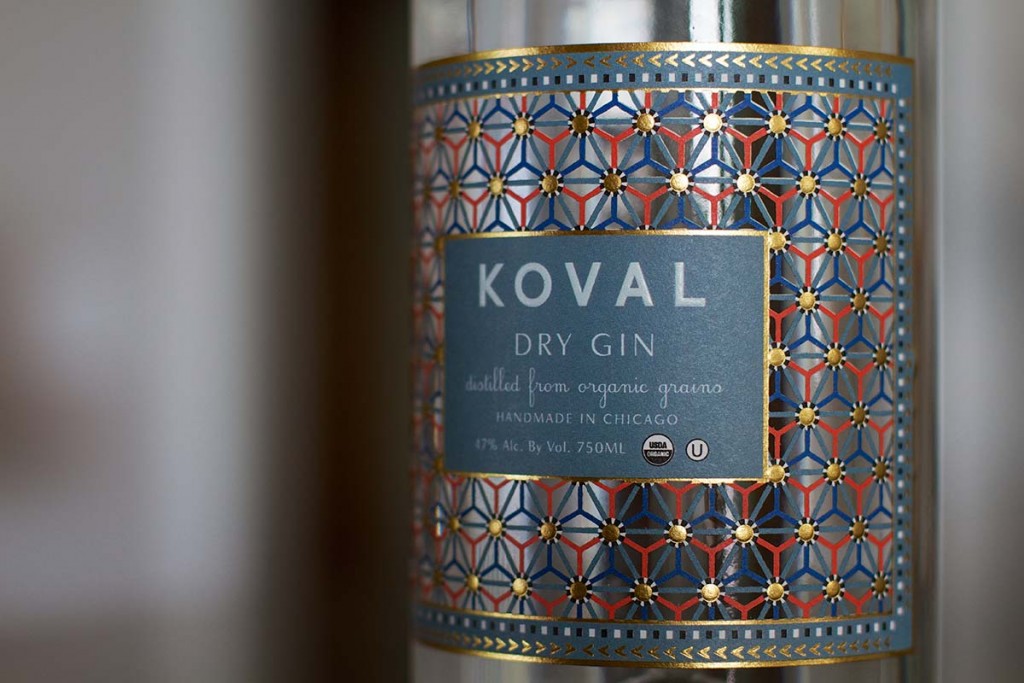
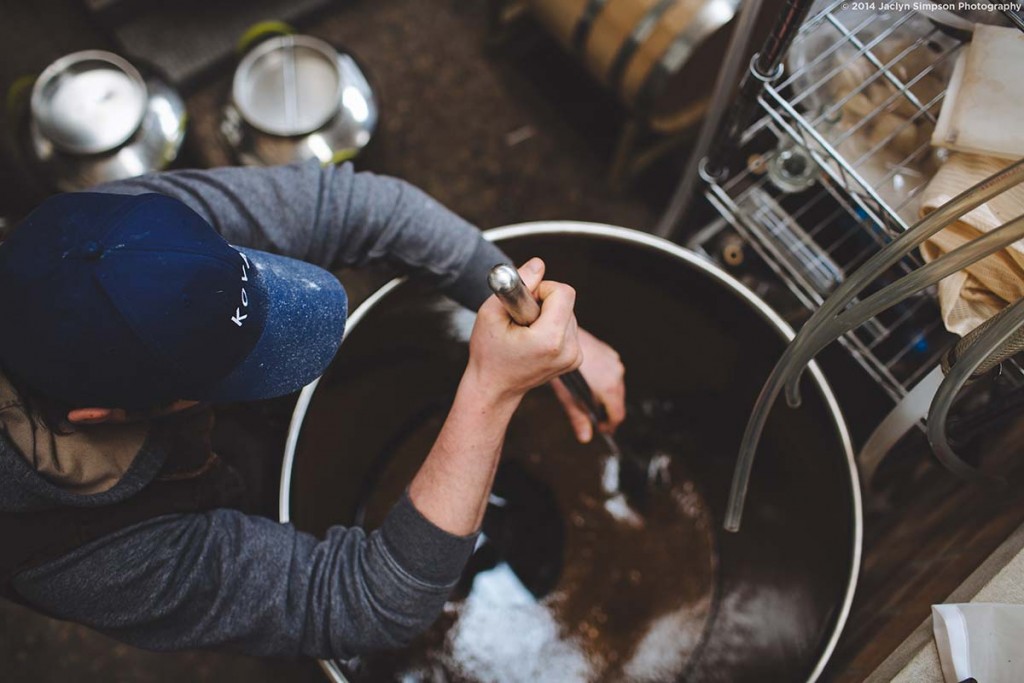
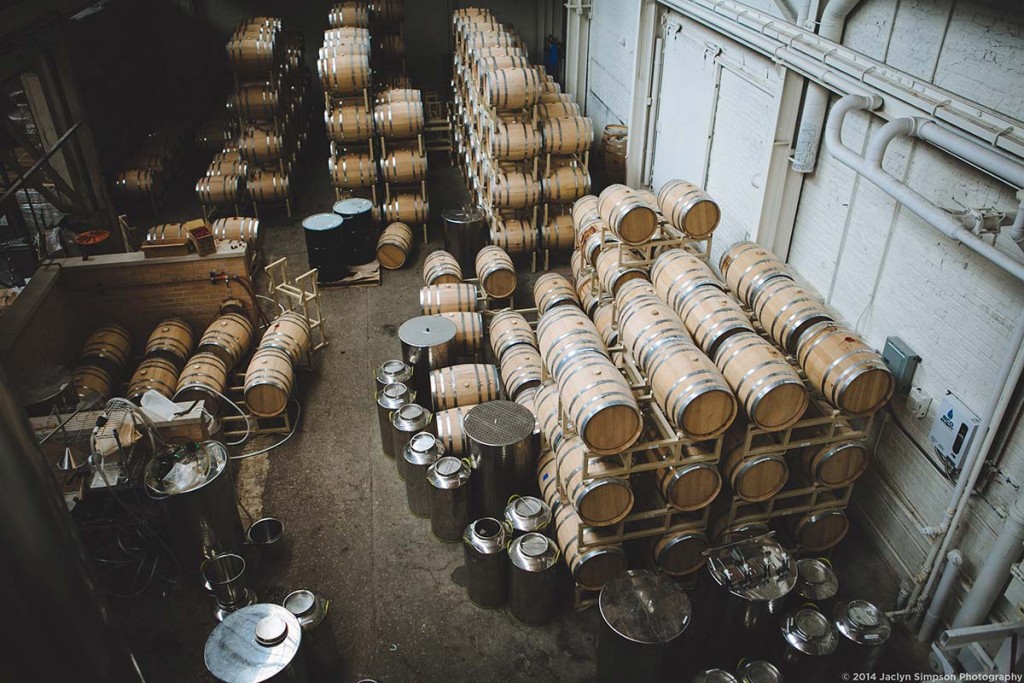
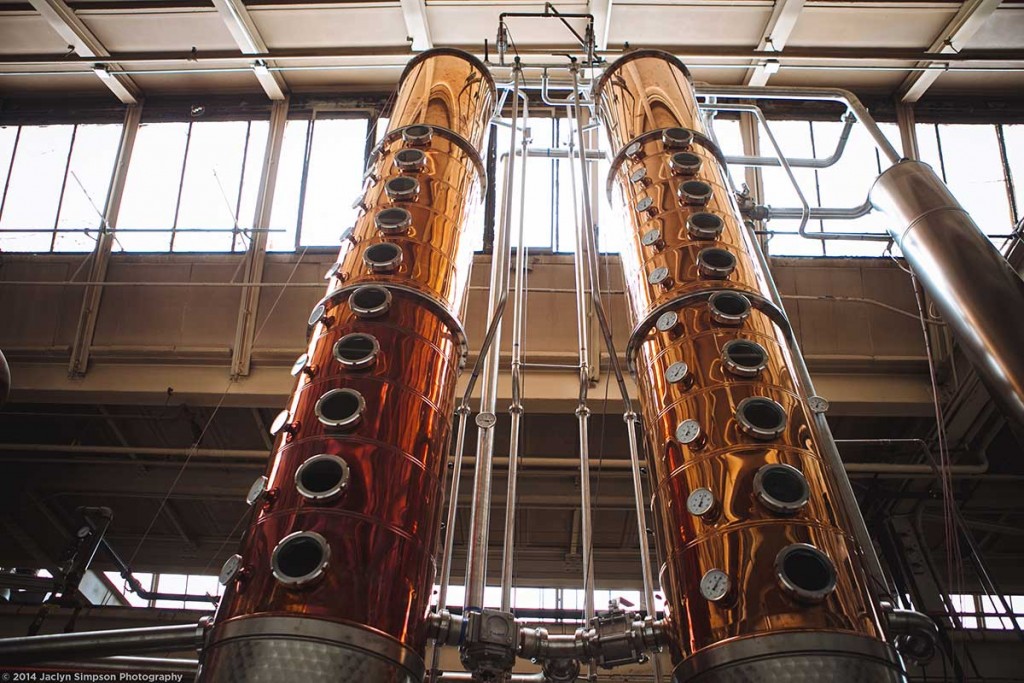
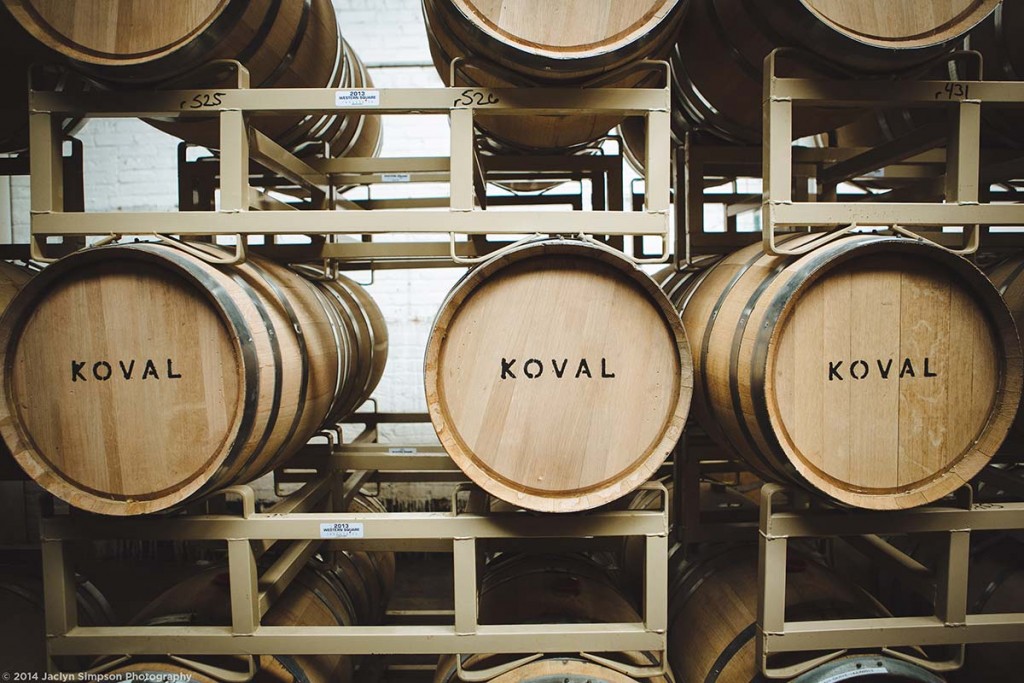
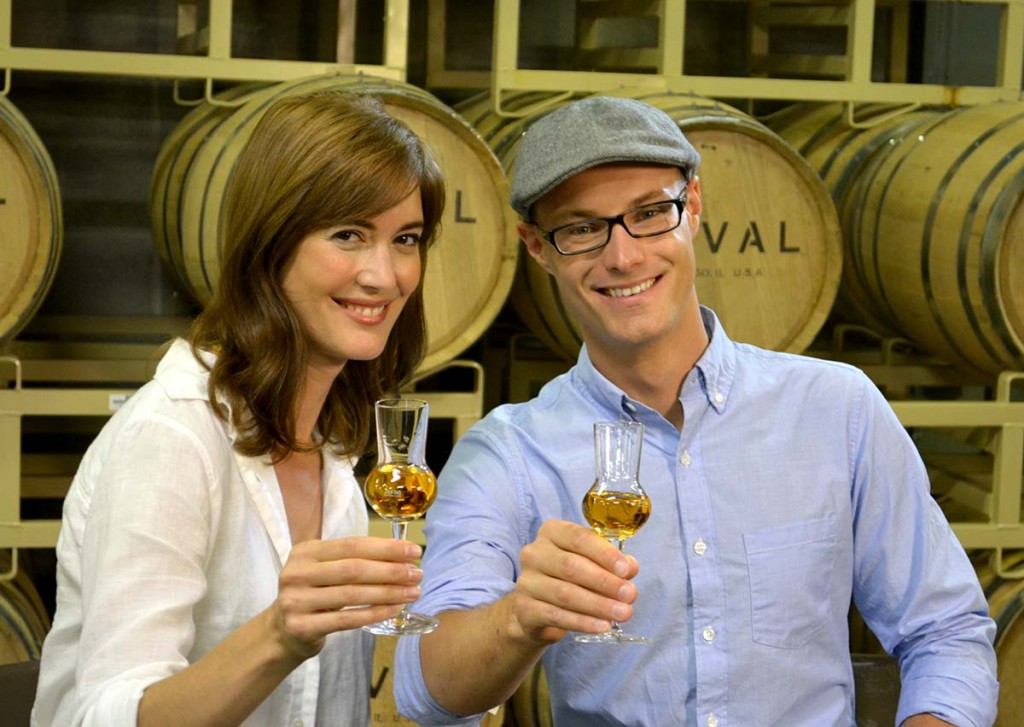



1 Comment